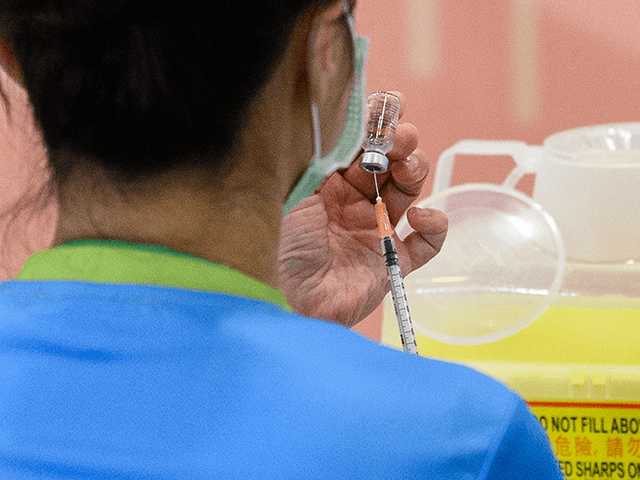Chinese health authorities and state media aggressively defended “Coronavac,” a Chinese coronavirus vaccine candidate by the Chinese firm Sinovac, on Wednesday after a 63-year-old Hong Kong man died this week following the administration of his first dose.
Coronavac is the first of two Chinese-made coronavirus vaccines approved by the Communist Party. Scoring at a little over 50-percent effectiveness rate in preventing Chinese coronavirus infections, it is considered among the lowest-quality vaccines currently approved for distribution on a large-scale level. It is particularly ineffective compared to two of the three vaccines approved for emergency use in the United States: the vaccine by Pfizer, which is 95 percent effective, and the Moderna product, testing at 94-percent effectiveness.
The Chinese Communist Party has undertaken a global campaign to sell “Coronavac” to allied nations, particularly impoverished countries that cannot afford the American products. It has done comparatively little to advertise the vaccine at home, resulting in extremely low rates of interest among Chinese people in taking it. A poll published last month found that less than half of health workers in Zhejiang, China, were interested in taking a coronavirus vaccine. About 28 percent said they would not seek out the vaccine on their own once it was approved for regular, not just emergency, use.
Similarly, in Hong Kong, a University of Hong Kong poll published in January showed less than 30 percent of residents were willing to take “Coronavac,” compared to 46 percent who would take a vaccine against coronavirus generally. The distrust in the formerly autonomous city appears to be growing rapidly in light of the death of a 63-year-old man Sunday shortly after taking his first dose of the Sinovac product.
The man, local sources reported, suffered from several physical ailments that made him a candidate for early vaccination, including high blood pressure, diabetes, and bronchitis. He received his first dose of Coronavac on Friday and died Sunday. Hong Kong health officials noted the doctors tending to him did not know that he had received a dose of a coronavirus vaccine when he was hospitalized on Sunday, possibly leading them not to pursue life-saving treatment.
Both Hong Kong and Communist Party officials have repeatedly insisted they do not have evidence directly linking the vaccination to his death.
“At the moment, the causal relationship with the vaccination could not be ascertained,” Hong Kong’s Department of Health said in a statement.
China’s Global Times, a state propaganda outlet, insisted Wednesday a link between the vaccination and the man’s death was “extremely unlikely,” instead claiming that vaccines using mRNA technology, like the Pfizer and Moderna products, are more dangerous. The Global Times has repeatedly attacked Pfizer, claiming a small number of deaths of senior citizens in Europe following the injection of the Pfizer product proved that it was more dangerous than Coronavac.
Among the “experts” that the Global Times quoted to make this claim was the CEO of Sinovac, Yin Weidong.
Despite the patient’s death, Yin said, “we are confident in the overall safety of the Sinovac vaccine as it was proven to be safe from observations of mass vaccinations.”
Another “expert” in the piece, the head of the China Vaccine Industry Association, dismissed the death as a “coincidence.”
A third, a Party-approved Hong Kong official, insisted in the piece that the vaccine is “safe and effective, the benefits outweigh the risks, and the vaccination program will continue.” Yet another Hong Kong official complained that Hong Kong’s free media was “sensationalizing” the issue; unlike communist China, Hong Kong has a long history of maintaining free, spirited journalism, though Beijing has recently attempted to suppress that tradition.
Hong Kong began vaccinating its population Friday, the same day the unidentified victim received his first dose of the Sinovac product. The vaccination program is open to those age 60 or older, health workers, or those with medical conditions that make them vulnerable to severe coronavirus infection. “Coronavac” is the first vaccine to be distributed, but the Hong Kong government expects to offer a variety of products in the future.
The Sinovac vaccine uses inactivated coronavirus cells to spur the human immune system to create antibodies, preventing an infection. This is a more traditional vaccination method than the technology used by the Pfizer and Moderna vaccines, which prompt the creation of antibodies with the introduction of mRNA, a protein present on the surface of the coronavirus cell without actually exposing the human body to coronavirus.
China approved another vaccine last week by a different pharmaceutical company, Sinopharm, found to be 72.51 percent effective.
Chinese media, and the Global Times in particular, have launched a campaign against Pfizer, claiming “Chinese health experts” believe its far more effective vaccine to be deadly.
“Yang Zhanqiu, a virologist from Wuhan University, told the Global Times on Friday that the death incident, if proven to be caused by the vaccines, showed that the effect of the Pfizer vaccine and other mRNA vaccines is not as good as expected, as the main purpose of mRNA vaccines is to heal patients,” a Global Times article warned in January. Yang again attacked Pfizer in Wednesday’s article about the Hong Kong death.
An anonymous Beijing immunologist told the state media outlet in January that “the world should suspend the use” of the Pfizer product and turn to Chinese alternatives, instead.
The deaths the Global Times has referred to of patients receiving the Pfizer vaccine occurred in Norway; the victims were all over 80 years old, some over 90 years old, and all in frail health condition.
A Chinese firm contracted to buy 100 million doses of the Pfizer vaccine in December.

COMMENTS
Please let us know if you're having issues with commenting.